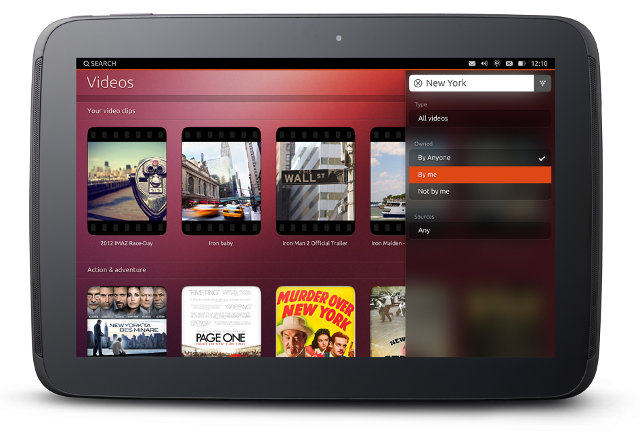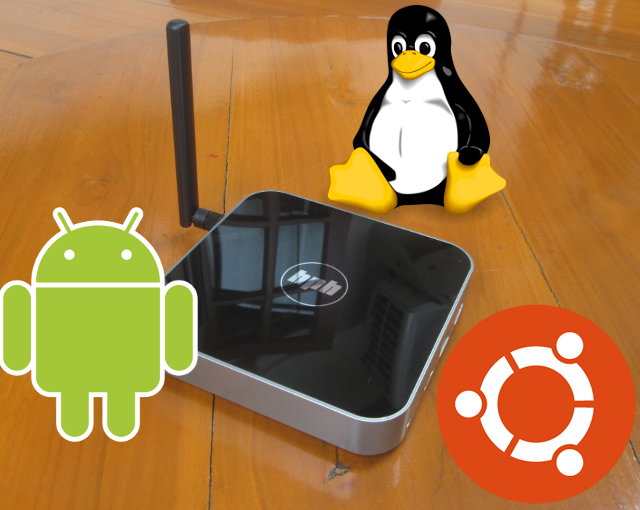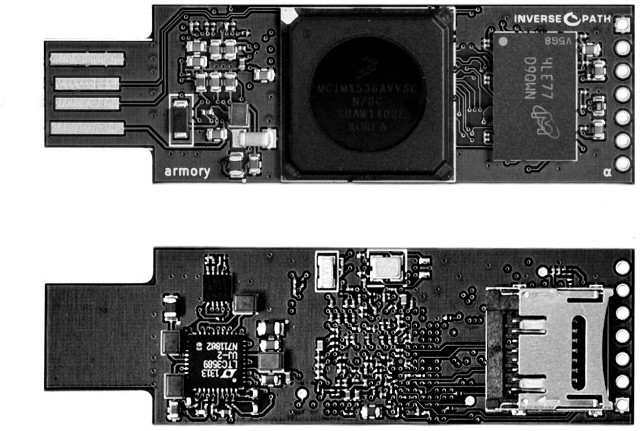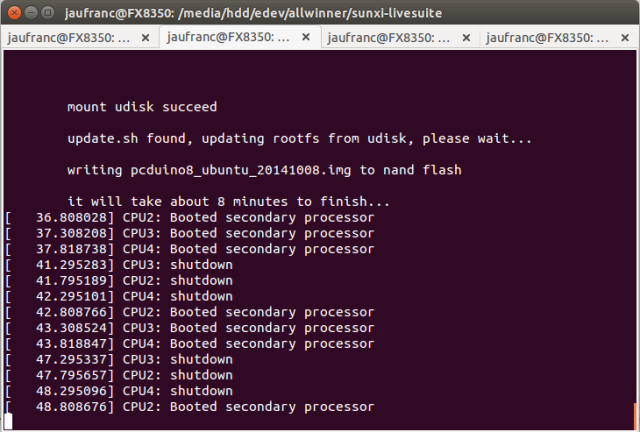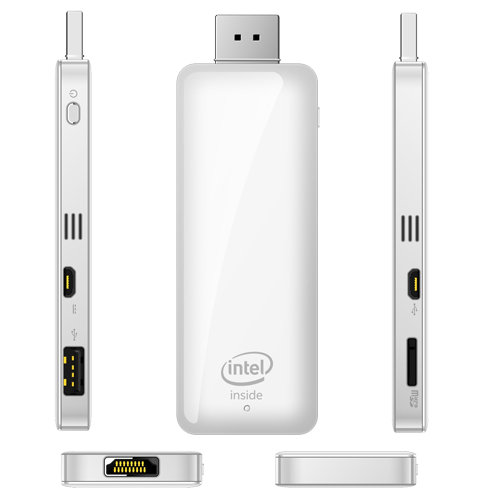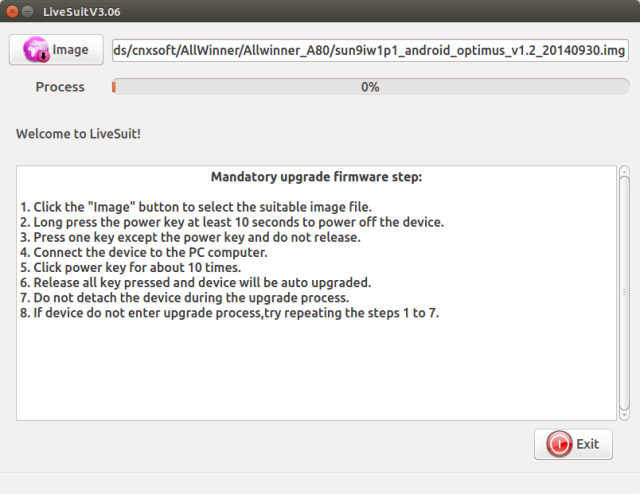Banana Pi development board was launched about half year ago with Raspberry Pi model B form factor, but with more powerful Allwinner A20 dual core processor, and extra interfaces such as SATA. A few months later, the Raspberry Pi foundation launched Raspberry Pi Model B+ with pretty much the same specifications, but a different board layout and connector placement, and LeMaker has now designed a new version of the AllWinner A20 development board called “Banana Pro” that’s somewhat similar to R-Pi B+ board layout, with a 40-pin header, and similar connector placement, minus a few differences, such as using two USB ports instead of four, and the addition of a Wi-Fi module. Banana Pro specifications with differences against Banana Pi highlighted in bold: SoC- Allwinner A20 dual core Cortex A7 processor @ 1 GHz with Mali-400MP2 GPU System Memory – 1 GB DDR3 Storage – micro SD card slot, SATA […]
Qualcomm Releases Userspace Adreno 320 GPU Drivers for Ubuntu
Qualcomm Developer Network has just sent the October Newsletter by email, and they had some news specific to Ubuntu / Linux support on IFC6410 development board powered by a Snapdragon 600 processor. Firs they link to a guest blog post on Qualcomm website entitled “Video Conferencing on Linux with the Qualcomm Snapdragon 600 Processor“, where Qualcomm partner eInfochips stated: Qualcomm Technologies, Inc.’s leadership in mobile market with Linux Android support is well established. As the demand for Qualcomm Snapdragon processors, a product of Qualcomm Technologies, Inc., increase in adjacent markets, the need for non-Android Linux support becomes evident. Which is always good to read. The rest of the post blog provides a few more details about their a low-latency (50ms glass-to-glass) video conferencing solution based on OpenEmbedded build with Linaro Linux Kernel, and making use of Qt5, Gstreamer, and Sofia SIP library. Further improvements will be achieved with hardware video […]
Mastermind UT One is an Upcoming Ubuntu Touch Tablet Powered by Intel Bay Trail-T SoC
Canonical unveiled Ubuntu Touch for Phones & Tablets early 2013, launched an impressive yet failed crowdfunding campaign for Ubuntu Edge smartphone in Summer 2013, and after many more months of development, Ubuntu Touch phones are expected by the end of the year with Ubuntu version of Meizu MX3/MX4 and BQ Aquaris. Ubuntu Touch tablets may be coming soon as Phoronix has been informed of an upcoming UT One tablet powered by Intel Atom Z3735D and running Ubuntu Touch. UT One specifications: SoC – Intel Atom Bay Trail-T Z3735D quad core processor @ 1.33 to 1.5 GHz with Intel HD Graphics Gen 7. System Memory – 2GB DDR3L Storage – 16 GB internal flash + micro SD slot Display – 10.1″ IPS LCD with 1280×800 resolution. 10-point touch screen Video Output – micro HDMI Audio I/O – 3.5mm audio port, HDMI, 2x built-in speakers Connectivity – 802.11 b/g/n Wi-Fi, Bluetooth 4.0 […]
Preliminary Dual Boot Android & Ubuntu Firmware for Nagrace HPH NT-V6 TV Box (Rockchip RK3288)
Nagrace NT-V6 TV Box is powered by Rockchip RK3288 processor, and in my review I found the hardware to be pretty good, although some progress had to be done on the firmware. The company is still focus on perfecting Android firmware for NT-V6 and Firefly-RK3288 development board, but in meantime, they’ve released a dual boot image capable of running either Android 4.4 or Ubuntu (14.04?). To give it a try download HPH-RK3288-Android-Ubuntu_20140924.rar. I haven’t been able to try it myself, because Google Drive download is extremely slow today. Once the download is complete, you’ll probably need to flash the firmware using Rockchip AndroidTools (windows) or upgrade_tool command line utility (Linux). The dual boot firmware is based on Android firmware 1.3.9 released on September 30, plus an Ubuntu root file system. It’s not overly convenient to use Ubuntu, because you need to enter recovery mode by inserting a sharp oject (e.g. […]
USB Armory is an Open Source Hardware Freescale i.MX53 Dongle for Security Applications
Most computers-on-a-stick come with an HDMI port, and a few USB ports, but Inverse Path’s dongle is quite different. USB Armory is a flash drive sized computer powered by Freescale i.MX53 Cortex A8 processor with only a USB port and a micro SD slot, that targets security applications such as mass storage devices with automatic encryption, virus scanning, host authentication and data self-destruct, VPN routers, electronic wallets, password managers, portable penetration testing platforms, and so on. USB Armory specifications: SoC – Freescale i.MX53 ARM Cortex-A8 @ 800Mhz with ARM TrustZone System Memory – 512MB DDR3 RAM Storage – microSD card slot USB – 1x USB host port. USB device emulation: CDC Ethernet, mass storage, HID, etc. Expansion Header – 5-pin breakout header with GPIOs and UART Misc – customizable LED, including secure mode detection Power – 5V via USB (<500 mA power consumption) Dimensions – 65 x 19 x 6 […]
Updated Android 4.4 Beta and Ubuntu Images for pcDuino8 / A80 OptimusBoard Boards Released
pcDuino8 and A80 OptimusBoard are the only two Allwinner A80 development boards currently “somewhat” available, and albeit the PCB color is different, every else is basically identical, and pcDuino8 firmware should probably run on A80 OptimusBoard and vice versa. If you own any of these boards, you may interested in two images, one with Android 4.4 (beta), and one with Lubuntu, recently released by pcDuino / Linksprite. Android 4.4 (beta) 2014-10-08 – sun9iw1p1_android_optimus.img to be flashed with PhoenixCard (Windows) or Livesuit (Linux) Lubuntu 14.04? 2014-10-08 is comprised of two files: Kernel – pcduino8_kernel_livesuit_20141008.img to be flashed with PhoenixCard or Livesuit first. See instructions to use Livesuit with A80 OptimusBoard. Rootfs – pcduino8_ubuntu_20141008.rar. First extract the rar files to the root of an SD card or USB flash drive. There should be two files: pcduino8_ubuntu_20141008.img and update.sh. Now connect the mass storage device to pcDuino3 / A80 Optimusboard, and reboot the […]
MEEGO-T01 HDMI TV Stick Supports Android, Windows 8.1, and Ubuntu/Linux
ARM based HDMI TV dongles have been available for over two years, mostly running Android, but the community has managed to install Linux desktop operating systems such as Ubuntu or Debian on these tiny gadgets with some limitations. But now that Intel is making low power SoC for tablets, at least one company has decided to make an HDMI TV stick powered by Intel “Bay Trail-T” Z3735F/G quad core processor, which can run Android, Windows 8.1, and Linux based desktop operating systems such as Ubuntu. Meegopad MEEGO-T01 (aka APM-D01?) hardware specifications: SoC – Intel Atom Z3735F / Z3735G “Bay Trail” quad core processor @ 1.33 GHz (Bust freq: 1.83 GHz) with Intel HD graphics (2W TDP) System Memory 1 GB DDR3L-1333 for Z3735G (32-bit up to 5.3 GB/s) 2 GB DDR3L-1333 for Z3735F (64-bit up to 10.6 GB/s) Storage – 16 or 32 GB eMMC + micro SD slot Video […]
How to Upgrade Allwinner A80 OptimusBoard Firmware
After informing Allwinner I had some rather slow write speed (3MB/s) to the NTFS partition of my USB drive on my A80 OptimusBoard, they kindly provided a new compressed Android firmware image (sun9iw1p1_android_optimus_v1.2_20140930.img.7z) with some NTFS optimizations that can be downloaded from baidu (password: x2tz), mega.co.nz or simos.info (please only use this link, if the other two do not work as it’s a private website and monthly bandwidth may be limited). I vaguely remember tools like LiveSuit (Linux) or PhoenixSuite (Windows), and I ended up on sunxi-linux Livesuit wiki as I’m running Ubuntu 14.04 on my PC, but you should be able to flash the firmware with PhoenixSuite if you run Windows. The instructions below can also be used for other Allwinner based devices. First you need to install LiveSuit, and build Allwinner USB drivers as follows:
|
1 2 3 4 5 6 7 8 |
sudo apt-get install dkms git build-essential git clone https://github.com/linux-sunxi/sunxi-livesuite.git cd sunxi-livesuite/awusb make sudo cp awusb.ko /lib/modules/`uname -r`/kernel/ sudo depmod -a sudo modprobe awusb cd.. |
In order to use LiveSuit as a normal user, you also have […]




